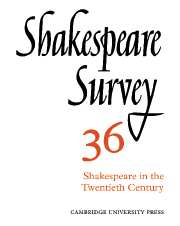Book contents
- Frontmatter
- Shakespeare and the Living Dramatist
- Blood and Wine: Tragic Ritual from Aeschylus to Soyinka
- Hamlet Andante/Hamlet Allegro: Tom Stoppard’s Two Versions
- Auden, Shakespeare, and the Defence of Poetry
- Graves on Lovers, and Shakespeare at a Lovers’ Funeral
- Tragic Balance in Hamlet
- Hamlet Across Space and Time
- Shakespeare’s Scripts and the Modern Director
- ‘He Shall Live a Man Forbid’: Ingmar Bergman’s Macbeth
- Komisarjevsky at Stratford-upon-Avon
- Troilus and Cressida and the Definition of Beauty
- The Pastoral Reckoning in Cymbeline
- New Created Creatures: Ralph Crane and the Stage Directions in The Tempest
- Arden of Faversham
- ‘Pickleherring’ and English Actors in Germany
- Shakespeare Performances in Stratford-upon-Avon and London, 1981–2
- The Year's Contributions to Shakespearian Study 1 Critical Studies
- 2 Shakespeare’s Life, Times and Stage
- 3 Textual Studies
- Index
- Plate Section
Komisarjevsky at Stratford-upon-Avon
Published online by Cambridge University Press: 28 March 2007
- Frontmatter
- Shakespeare and the Living Dramatist
- Blood and Wine: Tragic Ritual from Aeschylus to Soyinka
- Hamlet Andante/Hamlet Allegro: Tom Stoppard’s Two Versions
- Auden, Shakespeare, and the Defence of Poetry
- Graves on Lovers, and Shakespeare at a Lovers’ Funeral
- Tragic Balance in Hamlet
- Hamlet Across Space and Time
- Shakespeare’s Scripts and the Modern Director
- ‘He Shall Live a Man Forbid’: Ingmar Bergman’s Macbeth
- Komisarjevsky at Stratford-upon-Avon
- Troilus and Cressida and the Definition of Beauty
- The Pastoral Reckoning in Cymbeline
- New Created Creatures: Ralph Crane and the Stage Directions in The Tempest
- Arden of Faversham
- ‘Pickleherring’ and English Actors in Germany
- Shakespeare Performances in Stratford-upon-Avon and London, 1981–2
- The Year's Contributions to Shakespearian Study 1 Critical Studies
- 2 Shakespeare’s Life, Times and Stage
- 3 Textual Studies
- Index
- Plate Section
Summary
‘I am not in the least traditional,’ said Theodore Komisarjevsky, in his motto-statement to the press shortly before the opening of his first Stratford production. This was no other than the truth, and Komisarjevsky went on to illustrate it in six remarkable productions at the Shakespeare Memorial Theatre, from 1932 to 1939. They amused, astonished, and outraged. They gave the Theatre what international distinction it possessed during an otherwise lean period. They anticipated much of what has come to be regarded as normal, on today’s stage. Even so, Komisarjevsky’s seven seasons at Stratford have until recently been thought of as the work of a brilliant prankster, a professional enfant terrible. It is time to review as a whole Komisarjevsky’s work at Stratford.
To begin with, the Stratford seasons contain almost all of Komisarjevsky's Shakespearian work on the English-speaking stage. His King Lear at Oxford in 1927 (with Randle Ayrton as Lear) was a pilot for the Stratford Lear of 1936. The notorious Antony and Cleopatra (New Theatre, 1936) was his only Shakespearian production of the 1930s in London. There is a late appendix, which I shall deal with in its place. Otherwise, there is nothing of substance; and Komisarjevsky was generally known as a director of modern plays, above all as a master of Chekhov. It is in that capacity that Gielgud praises him highly in his memoirs. When Komisarjevsky came to direct The Merchant of Venice at Stratford in 1932, he was a month short of his fiftieth birthday: his reputation was already made, almost entirely outside Shakespeare.
- Type
- Chapter
- Information
- Shakespeare Survey , pp. 73 - 84Publisher: Cambridge University PressPrint publication year: 1983
- 1
- Cited by



